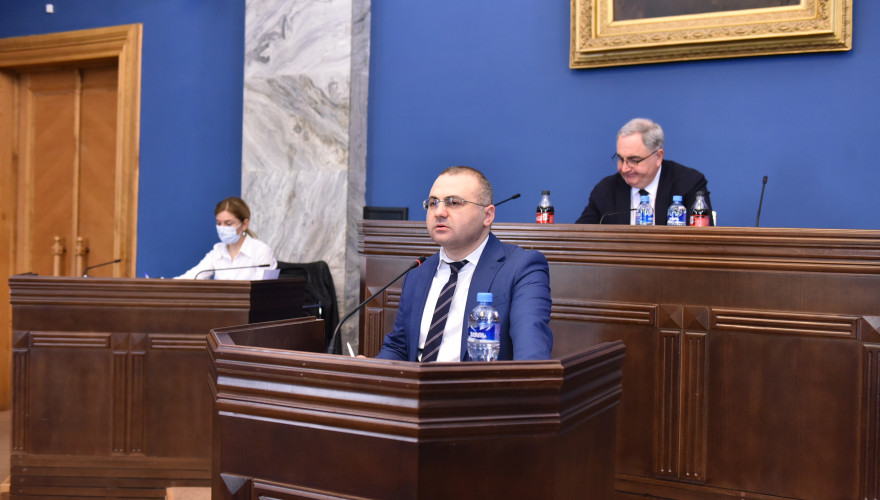The sitting of the Budget and Finance Committee

The Committee discussed the Bills initiated by the Government on: UN Convention on the International Settlement Agreements resulting from Mediation; Changes to the Law on Mediation; Change to the Civil Code of Practice; Change to the Law on State Fees. and Change to the Law on Enforcement Proceedings, introduced by the Deputy Justice Minister, Beka Dzamashvili.
He introduced the UN Convention on the International Settlement Agreements resulting from Mediation.
According to him, the Convention aims at creation of the uniform harmonized legal frame for the agreements resulting from mediation, application of international settlements and their enforcement. The Convention is a legal instrument for facilitation and mediation of international trade, as an alternative mechanism and encouragement for commercial disputes. It entails certain legal changes to four laws: On Mediation; on Civil Code of Practice; on State Fees, and on Enforcement Proceedings. By reflecting the provisions of the Convention to the Law on Mediation, the condition established under the legislation of Georgia for recognizing the Convention as mandatory will be fulfilled and besides, these changes will facilitate the development of mediation in Georgia as an alternative mechanism of dispute resolution.
The reporter answered the questions and MPs expressed their positions about the Bills.
The Committee, providing the expressed remarks, approved the Bills and discussed the Bill on Entrepreneurs introduced by the Chair of the Human Rights and Civil Integration Committee, Mikheil Sarjveladze.
The Bill is initiated by Mikheil Sarjveladze, Ana Buchukuri, Tea Tsulukiani, Shalva Papuashvili, David Songulashvili, Maka Bochorishvili, David Matikashvili, Aluda Gudushauri, Mikheil Daushvili and Beka Liluashvili.
As the reporter noted, the law on Entrepreneurs was adopted in 1994 and despite various changes introduced, it fails to fulfill the established objectives. Thus, it requires the development of the regulations adjusted to the modern requirements and challenges. At that, pursuant to the EUAA agenda, Georgia carries certain commitments to be reflected in the legislation.
“The Bill has been discussed by various Committees and was approved. It is still discussed by active engagement and I hope, the expressed positions and recommendations will be shared at the II reading”, - M. Sarjveladze noted.
The necessity of re-definition of the regulations and fulfilment of the EUAA agenda were two key factors for development of the Bill. The package was developed in the Justice Ministry and in case as for the previous package, the authors were backed by international donors.
M. Sarjveladze introduced the novelties of the Bill and answered the questions.
The Committee approved the Bill and discussed with the III reading the Bill on Deposit Insurance System, introduced by the First Deputy Economic Minister, Ekaterine Mikabadze.
The Bill provides the contextual and technical changes to ensure flexibility of the investment policy and efficiency of disposal of the investment funds. The initial version reflected the recommendations expressed at the Committee hearings.
MP Dimitri Khundadze introduced the Bills on Social Aid; State Pension; and State Compensation and State Academic Scholarship. The Bills envisage the legalization of the excessively issued living allowance and social packages and exemption of certain persons from the financial liability towards the state due to the accrual of these sums, which will be yet another expression of the support to the vulnerable families against the pandemic-related problems. The living allowances excessively issued before July 20, 2020, as well as the social package, shall be considered legalized and shall not be subject to the refund. At that, already deduced sums, as well as any other amounts, shall not be refunded by the persons to the state. Besides, the Bills envisage the termination of the administrative, judicial and enforcement proceedings related to the levy of these to the state budget.
The changes ensure compliance of the calculation of the state compensation for the persons with the high diplomatic rank with the Law on State Compensation and State Academic Scholarship and its objective – the state compensation is the guarantee of social protection of Georgian citizens towards the state due to their special merit.
As D. Khundadze explained, the Bills eliminate the gaps in the Law and ensure calculation of the compensation according to the salaries as of the moment of establishment of the compensation. Article 15 of the Law on State Compensation and State Academic Scholarship shall be reformulated that the amount of compensation for the persons with high diplomatic rank shall be determined in line with the salaries for the high diplomatic position as of the moment of establishment of the compensation.
The Bill on State Compensation and State Academic Scholarship was introduced by the Deputy Foreign Minister, Khatuna Totladze.
The Bill eliminates the gaps and calculates the compensation for the persons with high diplomatic rank in line with the objective of the Law.
As of today, the compensation for such persons at the age of 65 constitutes one-third of the salary he/she had during the last year of his/her position, which often equals to the low salaries existing 15-20 years ago.
The Bill envisages the compensation according to the moment of establishment of the compensation.
The Committee approved the Bill.
